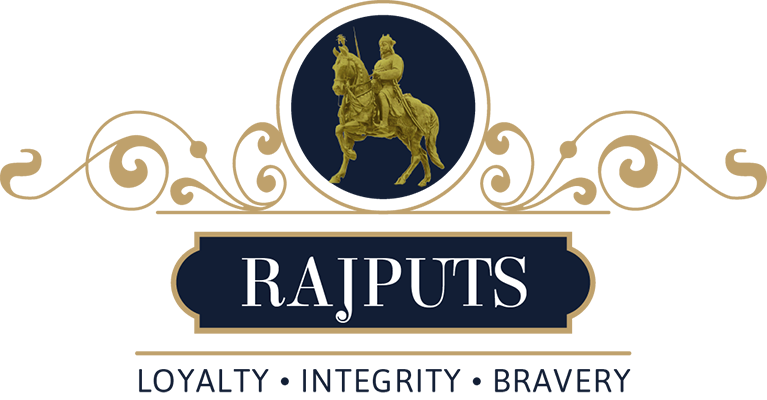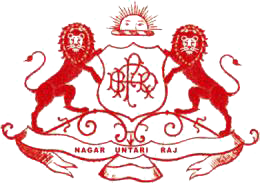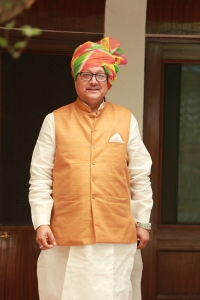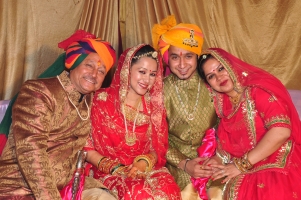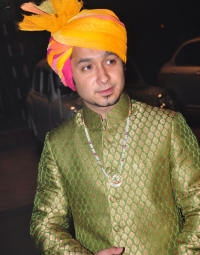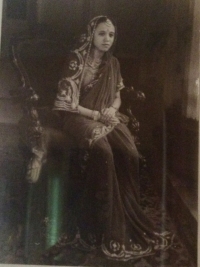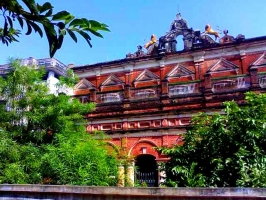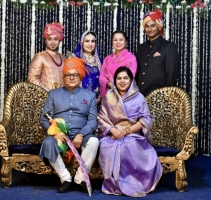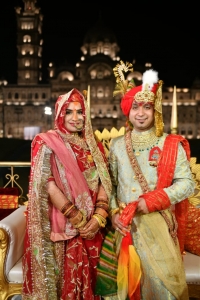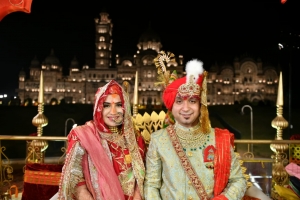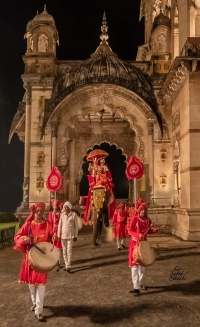Present Head
- Vasundhra Raj Laxmi, married to Yuvraj Divyaraj Singh of Rewah, Madhya Pradesh.
- Raj Ratna Pratap Deo
History
This family is a branch of that of Sonepura of the Surajbansi dynasty. Sonepura has had fifty six Rajahs. In the reign of the fifty six Rajah, the title of Rajah was withdrawn in consequence of some complications during the mutiny of 1857. The Untari family became separated from the Sonepura or parent branch during the reign of Rajah Raghonath Singh, the fourty fifth ruler. The cause of separation was briefly as follows :- Prassanno Rai Singh, the fourty fourth Rajah of Sonepura had two sons, the elder of whom was Utter Rai and the younger, Raghonath Singh. When Rajah Prassanno Rai died , Utter Rai was absent from home on a pilgrimage, and in consequence of this the younger brother, Raghonath Singh was placed on the gaddi.
Subsequently Utter Rai returned, but as it was too late then and as he could not depose his younger brother, he was granted the Deonkara estate comprising ninety seven villages situated in Tuppah Rampore in Pergannah Belonjah ( now in the Palamau District ) for his maintenance and was styled Bhaiya (Brother). Unrudh Rai, the third Bhaiya, under orders of the Emperor of Delhi, Subjugated Tuppah Untari because of the contumacy of Rudra Sahi, its then Rajah. After subjucation the Tuppah was granted as a rent free jagir by the emperor to the said Bhaiya Unrudh Rai, in Fasli 1609.
Narhar, the fourth Bhaiya, was in great favour at the court of Delhi on account of his magnificent physique and his almost superhuman strength, and he was therefore granted the title of Deo in Fasli 1077. Henceforth these chiefs have born e the style of Bhaiya Deo. On 31st August 1797, the British Government confirmed to Bhaiya Bodh Singh Deo the rent free title to Tuppah Untari, and on the 10th December 1840 the same government, after enquiry under Regulations II of 1819 and III of 1828, confirmed to Bhaiya Bhagwan Deo the rent free title to the Deonkara estate in Pergannah Belonjah.
There have been up-to-date seventeen Bhaiyas; their names are as follow :- 1. Utter Rai, 2. Ramchandra Rai, 3. Unrudh Rai, 4. Narhar Deo, 5. Lachmi Deo, 6. Pirthi Deo, 7. Naipal Deo, 8. Pohoop Deo, 9. Bodh Singh Deo, 10. Bhawani S. Deo, 11. Tej Singh Deo, 12. Bhagwan Deo, 13. Jai Singh Deo, 14. Dirgaj Deo, 15. Raj Kishore Deo, 16. Rudra Pratap Deo, 17. Shankar Pratap Deo. Information is not forthcoming to show when each ascended the gadi, or how long each sat on it. The fifth and the tenth Bhaiyas, Lachmi Deo and Bhawani Singh Deo, died without male isuue; the former was succeeded by Pirthi Deo, his younger brother, and the latter by Tej Singh Deo, son of Bhaiya Gajraj Deo, brother of Bhaiya Pohoop Deo, the eighth Bhaiya. The above is the only instance in which the son did not succeed the father i.e. of direct descent.
The Bhaiya Deos of Untari were invested with police functions throughout Untari Tuppah. Mention is first made of the Bestowal of such functions in the sanad granted by the Delhi Court to Bhaiya Narhar Deo in Fasli 1077, and the Bhaiya Deos continued to exercise such functions until the 1st January 1863 on the introduction of Act V of 1861, when the British Government commuted such services into an annual money payment of Police Cess. This commutation took place during the time of Bhaiya Bhagwan Deo, and at first the demand in money was Rs. 1,200 though subsequently in 1870 it was raised to Rs. 1,840-14-0, which sum represents three-fourths of the cost of maintaining the police force in the territory.
Bhaiya Bhagwan Deo was presented with a gun and a letter setting forth the services rendered by him during the mutiny of 1857. In 1871 he received the thanks of the Government, through the commissioner of the Division, for prompting education amongst his tenants. He received a letter of praise from Government for assistance rendered and for generosity displayed during the famine of 1874. In 1877 he received a certificate of honour in the name of Her Most Gracious Majesty the Queen Empress, for his loyalty, and liberty, and was exempted from the operation of the Arms Act.
In 1897 Bhaiya Dirgaj Deo received the thanks of Government for his liberality in giving a donation towards the erection of a dispensary at Daltonganj, the headquarters of the Palamau District. He Received a certificate of honour in the name of Her Most Gracious Majesty the Queen Empress of India for undertaking the chairmanship of the Untari Gratuitous Relief circle and managing it efficiently during the famine operations in 1897.
Rai Bhaiya Dirgaj Deo Bahadur died on the 27th February 1911, and was succeeded by his son, Bhaiya Raj Kishore Deo, on the 11th May 1911.
At present the family head is Bhaiya Raj Rajendra Pratap Deo (Elder Son of Bhaiya Shankar Pratap Deo) who is actively involved in the state's politics and resides in the royal fort of Nagar Garh.
Genealogy
- Bhaiya Rudra Pratap Deo
- Ramanuj Pratap Deo
- Bhaiya Uday Pratap Deo
- Rajesh Pratap Deo
- Rishi Pratap Deo, married to Mamta Singh Deo.
- Yash Pratap Deo
- Rishi Pratap Deo, married to Mamta Singh Deo.
- Rajesh Pratap Deo
- Bhaiya Vijay Pratap Deo
- Hriday Pratap Deo
- Avinash Pratap Deo
- Vibhooti Pratap Deo
- Kumari Avantika Deo
- Bhaiya Chandrachur Pratap Deo
- Markand Pratap Deo
- Bhaiya Bhupendra Pratap Deo
- Bhaiya Rajpal Pratap Deo
- Bhaiya Uday Pratap Deo
- Shankar Pratap Deo (qv)
- Ramanuj Pratap Deo
- Bhaiya Shankar Pratap Deo
- Raj Rajendra Pratap Deo (qv)
- Anant Pratap Deo
- Kiran Singh Chauhan
- Rajeshwari Singh
- Bhaiya Raj Rajendra Pratap Deo (see above)
- Kumar Saheb Umendra Pratap Deo, married Rajkumari Aruna Singh Daughter of Lal Ram Bahadur Singh Lal Saheba Kusum Devi of Dhourpur and has issues.
- Rajkumari Pallavi Singh, married to Kunwar Jitendra Bahadur Singh, son of Former Chief Minister Veer Bahadur Singh of Uttar pradesh and Former Cabinet Minister in Government of India.
- Rajkumar Saheb Vishesh Singh Deo, married to Rajkumari Divya Singh Deo, daughter of Raja Saheb of Maheba Uttar Pradesh.
- Kumar Saheb Anand Pratap Deo, married to Kuwrani Puja Singh Deo and has issue, one son.
